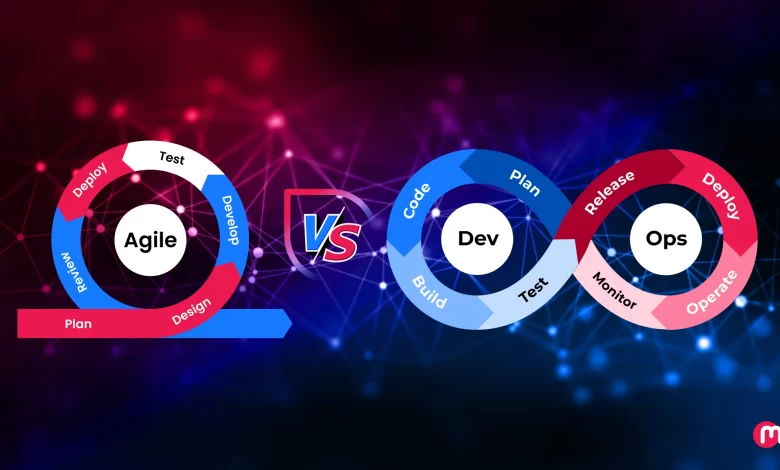How is DevOps Different from Agile Methodology?

Are you leading a tech initiative where delivery speed, collaboration, and continuous improvement are top priorities? Are you stuck between choosing DevOps vs Agile for your software development project? While these two methodologies may seem similar, they have significant differences, benefits, and challenges. In this detailed guide on DevOps vs Agile, we will break down both methodologies, compare them through a business lens, and show you when to choose one over the other and how they can work together.
### Understanding Agile Methodology
When we talk about Agile software development, we think of flexibility, collaboration, and customer-centric delivery. Agile is a software development methodology aligned with the values and principles of the Agile Manifesto. It focuses on iterative development and cross-functional team partnerships to deliver solutions. Agile teams work in small, manageable increments called “iterations” or “sprints” to accelerate software delivery and improve product quality.
Agile core values include prioritizing individuals and interactions over process and tools, delivering functioning software over comprehensive documentation, ongoing customer collaboration over contract negotiation, and responding to change over following a plan. The Agile principles cover customer satisfaction, welcoming changing requirements, delivering working software frequently, and promoting sustainable development.
### Pros and Cons of Agile Methodology
The benefits of Agile methodology include faster time-to-market, customer involvement throughout the project, adaptability to changing requirements, improved team collaboration, higher product quality, and reduced software failure risks. However, Agile also has challenges such as demanding high commitment and discipline, less predictability in timelines and deliverables, and scope creep risks.
### Exploring the DevOps Methodology for Continuous Delivery
DevOps, a combination of Development and Operations, is a practice that unifies IT teams and developers to streamline software development processes with automation. DevOps aims to break silos between development and operations teams, enabling faster and more reliable software releases. DevOps utilizes a CI/CD pipeline for continuous and automated software lifecycle.
DevOps work involves integrating, deploying, operating, and monitoring software in live environments. DevOps benefits include faster product time-to-market, improved team collaborations, higher deployment frequency, better product quality, and scalability. However, DevOps also faces challenges such as cultural resistance, complexity, and the need for expertise and time for setup.
### Key Differences Between Agile and DevOps
Agile focuses on the development process, while DevOps is more concerned with the software delivery lifecycle, from coding to deployment and beyond. Agile teams consist of developers, testers, designers, and product managers, while DevOps teams include developers, QA, system admins, and operations engineers. Agile uses sprints for short development cycles, while DevOps uses pipelines for automation and deployment.
Other key differences between Agile and DevOps include their purpose and focus, team structure, process and workflows, tools, feedback and improvements, automation, and security approach. While Agile and DevOps serve different purposes, they also share principles such as delivering value to customers quickly, breaking down team silos, leveraging automation, and emphasizing fast feedback and data-driven decision-making.
### When Do Agile and DevOps Work Together?
Agile and DevOps can work together effectively when streamlining the software development lifecycle, need for faster time-to-market, continuous feedback, building DevSecOps culture, and fostering a culture of collaboration and shared ownership. By combining Agile and DevOps, organizations can create a high-performance software delivery culture that is fast, reliable, collaborative, and continuous.
### Summing Up
When choosing between Agile and DevOps, it’s important to consider your project needs, goals, and structure. Agile is ideal for projects requiring flexibility, experimentation, and rapid iteration, while DevOps is best suited for automating deployments, enhancing operational reliability, and speeding up release cycles. Using both Agile and DevOps together often produces the best results, ensuring faster software delivery without compromising on quality.
### How MindInventory Supports Agile and DevOps Implementation
If you need assistance in implementing Agile or DevOps practices in your software development projects, you can hire a dedicated software development team from MindInventory. They offer consultation, analysis, tech stack evaluation, compliance security, and ongoing support to ensure successful implementation of Agile and DevOps methodologies.
### FAQs About DevOps Vs Agile
– Are DevOps and Agile the same?
No, DevOps and Agile are not the same. Agile focuses on iterative development and customer feedback, while DevOps brings developers and operations teams together for reliable software delivery.
– Which is faster, Agile or DevOps?
DevOps is generally considered faster in terms of software delivery due to its support for CI/CD.
– Is DevOps replacing Agile?
No, DevOps builds upon Agile principles to extend collaborations between developers and operations teams.
– Can we use both Agile and DevOps?
Yes, using both Agile and DevOps together often produces the best results.
– Which is better, Agile or DevOps?
It depends on your project needs and goals. Agile is ideal for flexibility and rapid iteration, while DevOps is best for automating deployments and enhancing operational reliability.
– Will DevOps end in the future?
DevOps is unlikely to end anytime soon as the need for integrated development and operations practices continues to grow in modern software engineering.
In conclusion, choosing the right software development methodology between Agile and DevOps depends on your project requirements and goals. By understanding the differences, benefits, and challenges of Agile and DevOps, you can make an informed decision that aligns with your business objectives.





